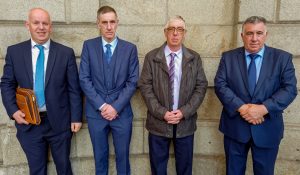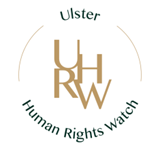On 14 November 2022, the President of the High Court in Dublin ordered that the family of Cpl James Elliott who was kidnapped, murdered, and his body booby trapped by the Provisional IRA in April 1972, be provided with a court file of the trial of two men before the Special Criminal Court in connection with the murder. This is the first-time victims of terrorism in Northern Ireland have recovered files from the Special Criminal Court and draws to attention the lack of a comparative legacy framework in the Republic of Ireland.
The order, in relation to a trial of two alleged IRA members that took place before the non-jury Special Criminal Court in July 1972, was granted by Mr Justice David Barniville following an application on behalf of the family of Cpl Elliott who for decades have been seeking answers in respect of his murder.
On 17 April 1972, James Elliott, a part-time corporal with the Ulster Defence Regiment, was working as truck driver doing delivery between Kingscourt, Co Cavan, and Warrenpoint, Co Down, when he was kidnapped at gunpoint by masked men near a border crossing at Newry. He was held for 30 hours before being murdered, after being shot multiple times with a machine gun.
The facts relating to the circumstances of his murder, including who was responsible, where the murder took place, and even in which jurisdiction it was committed, have yet to be properly established, making it a murder with particular poor degree of clarity for the family. There also remains a controversy as to whether Cpl Elliott was tortured prior to his murder, with the State adamant that this was not the case. These matters are currently in the hands of the Attorney General NI who will imminently make a decision on a new inquest.
The body of Cpl Elliott was left a few yards from the border at Newtownhamilton, in Co Armagh. It was used as a lure by the Provisional IRA for a planned larger attack on British security forces. Cpl Elliott’s body was left near to 500-600lbs of gelignite in steel containers in a culvert under the road.
Several ‘Claymore’ landmines were also placed near the site. Following an operation that involved security forces on both sides of the border, his body was recovered after the explosives were removed and detonated at a nearby field.
The IRA later admitted it had killed Cpl Elliott and claimed the married father of three sons had been killed while forcefully resisting abduction. The family strongly dispute that, and say medical evidence is entirely inconsistent with the IRA’s claim.
Gardai arrested two Co Monaghan men who were members of Provisional IRA, Brendan Finnegan and Patrick Lynch. These men were convicted by the Special Criminal Court of conspiring to commit an explosion and for possessing explosives. Information provided to the family by Gardai in 2020 confirmed that these men were never questioned for the Elliott murder, which is also the case for police in Northern Ireland.
Finnegan was jailed for 9 months while Lynch was jailed for 15 months. It is claimed that other charges including, conspiring to commit murder and attempted murder, were brought against the two men but were subsequently dropped. These charges related to the attempted attack on British security forces attempting to recover Cpl Elliott’s body, not to the murder itself.
While the trial of Lynch and Finnegan commenced soon after the murder and their conviction in the Special Criminal Court took place within three months, the family of Cpl Elliott were never informed about it and only discovered in 2005 that persons had been tried and convicted of offences clearly connected to the murder and abduction.
Represented by Michael Lynn SC one of the deceased’s sons, Jim Elliott, applied to be provided with the Special Criminal Court’s file on the case. Brendan Finnegan of Drummond, Inniskeen, Co Monaghan, was served with copies of Mr Elliott’s proceedings.
Patrick Lynch who was also from Inniskeen, died over a decade ago. He was described in an obituary published in the Irish Republican Newspaper An Phoblacht in 2009, which was put before the court in support of the application, as being an active member of the IRA’s South Armagh unit during the late 1960s and 70s before taking a prominent role in Sinn Féin in his later years.
Counsel said it was an “unusual case” and the application was in respect of one of the first cases to come before the Special Criminal Court after that court was established. Granting the application Mr Justice Barniville expressed his sympathies to the Elliott family and described their father’s murder by the Provisional IRA as being “horrendous”. He directed that the Elliott’s lawyers be given access to the original file, and that they also be provided with a copy of the file within the next seven days of that inspection. It was in the interests of justice that file be made available, the judge said.
Outside court Mr Jim Elliott, accompanied by his brothers Cyril and Lester and Mr Jonathan Larner, Ulster Human Rights Watch advocacy officer, welcomed the court’s decision to grant them access to the Special Criminal Court’s file.

He said he hoped the contents of the file would be the first step on the road to answering questions about their father’s murder. Ulster Human Rights Watch has supported the Elliott family since 2017, and the process to recover the file has taken a total of five years to accomplish. This has been three years in establishing how to go about recovering the file, and a two-year legal process. This case draws to attention the clear disparity in legacy provision between jurisdictions. In Northern Ireland, access to court files can be provided through a bespoke statutory instrument – the Court Files Privileged Rules Act 2016, which while slow is transparent, simple, and free. In the Republic of Ireland these is no process, with statutory bodies apparently unaware even of where the files may be held or how they might be accessed. After considerable effort it was established that the only route was to get an order from the High Court in Dublin.
The Elliott family and Ulster Human Rights Watch are thankful to the Bar of Ireland Voluntary Assistance Scheme that financially supported the action, otherwise it would not have been possible due to the costs it would have incurred (the family were still liable for Court and other fees amounting to almost €500). We would also thank Counsel and legal representatives for their excellent work in this case. The fact that victims need to go to Court in this way is one matter that needs to be addressed by the government of the Republic of Ireland if its criticism of legacy provision in Northern Ireland are to be taken seriously.
To financially support the Elliott family in future legal actions – please see their gofundme page: https://gofund.me/bf1f236a. Please note that this is separate from Ulster Human Rights Watch.
Newspaper coverage:
